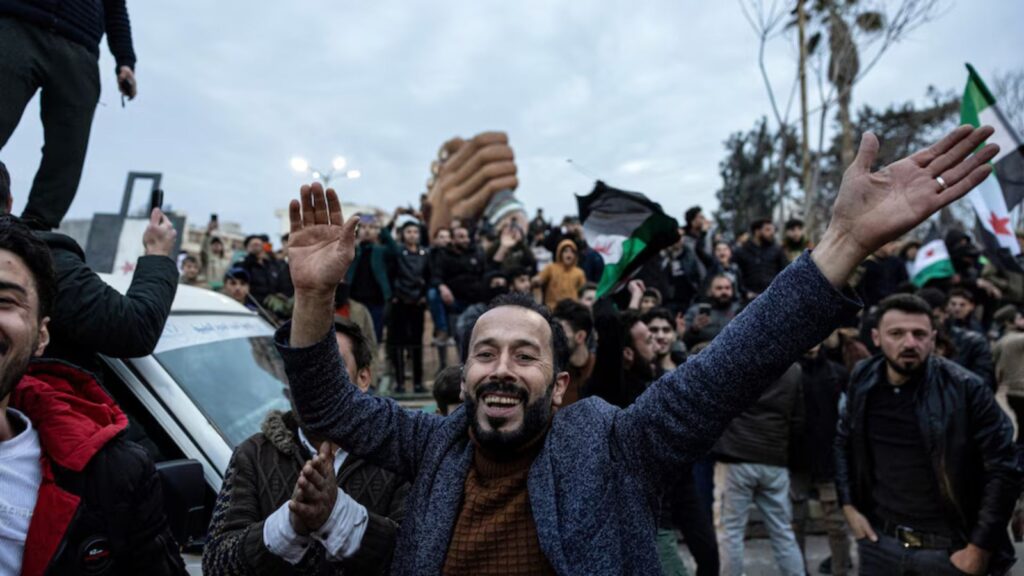Residents of Damascus celebrated the end of the Assad family’s 50-year rule with prayers in mosques and jubilant displays in the streets. People chanted anti-Assad slogans, honked car horns, and shouted “God is great.” Teenagers were seen picking up weapons discarded by security forces and firing them into the air. Visuals captured families walking toward the presidential palace, carrying household items. “It’s like a dream. I need someone to wake me up,” said Abu Laith, an opposition fighter.
As reported by Al Jazeerah, residents identified as Youssef Salah and Mohammad Mahmoud exchanged joyful cheek kisses from their motorbikes at Cola Roundabout, a bustling transport hub in Beirut.
“Today is the best morning,” said the smiling Mahmoud, 20. “We feel the biggest joy,” he added, gesturing toward Ali al-Abed, 20, who was seated behind him.
Meanwhile, several men at Syria’s embassy in Moscow raised the opposition flag, though a spokesperson confirmed that the facility was operating as usual, according to AFP
Reports emerged that ousted Syrian President Bashar al-Assad has arrived in Moscow and been granted asylum “out of humanitarian considerations,” according to Russian news agencies. The reports, which put an end to speculation about his whereabouts, were also confirmed by Russian TV.
Prime Minister Mohammed Ghazi al-Jalali, who is overseeing state bodies until they are handed over, has stated that most cabinet ministers continue to work from their offices in Damascus.
“We are working so that the transitional period is quick and smooth,” he told Sky News Arabia TV
Al-Jalali stated that the security situation had already improved compared to the previous day.
On Sunday, he expressed the government’s readiness to transfer power to any leadership chosen by the people.
“I am not leaving and I don’t intend to leave. I expect to ensure the peaceful continuation of public authorities, institutions, and the state apparatus, while guaranteeing the safety and security of all citizens,” he said in a video statement.
The Syrian Civil War, which has raged since 2011, has once again made international headlines following a dramatic shift in the conflict. Rebel forces, including groups such as HTS (Hay’at Tahrir al-Sham) and the Free Syrian Army, have recently captured Syria’s largest city, Aleppo, along with several nearby towns, marking their first major breakthrough in years.
The Origins of the Conflict
The war began in 2011, emerging from the broader wave of protests known as the Arab Spring. In the early stages, Syria’s government, led by President Bashar al-Assad, faced significant challenges as protests against his regime erupted. However, Assad’s position was eventually bolstered through military support from Russia and Iran, which helped him repel rebel forces and regain control over much of the country.

While the war persisted, a period of relative calm emerged in recent years as the Syrian Army, backed by its allies, managed to keep the opposition in check. But the recent escalation has shaken the status quo.
A Major Political Turn
Last week, the rebels launched a major turn, capturing Aleppo, Syria’s largest city. This success was their first significant victory in years, and it set the stage for a larger assault on Damascus. Over the next 24 hours, the rebels seized control of several other cities, including Daraa, Quneitra, Suwayda, and Homs. With both Russia and Iran preoccupied with other conflicts, the Syrian Army appeared unable to maintain control, collapsing under the pressure.
On Sunday morning, rebel forces took control of Saydnaya prison, releasing political prisoners long held by the Assad regime. Shortly afterward, the fighters advanced into Damascus and, within hours, captured the city, effectively overthrowing a regime that had been in power for over five decades. Prior to Bashar al-Assad’s rule, his father, Hafez al-Assad, had maintained an iron grip over Syria for nearly 30 years.
In response to the rebel advances, Prime Minister Mohammad Jalali declared that the government was ready to cooperate with the opposition and transfer power. He also appealed to the public to respect government buildings, which he emphasized belonged to all Syrians.
Reports suggest that, as rebels entered the capital, Assad fled the country on an early morning flight. His whereabouts are reportedly said to be in Moscow.
HTS, in a statement, declared Syria and Damascus free from the “tyrant Assad” and called on fighters to preserve government buildings, which were placed under the control of former Prime Minister Jalali in preparation for the official handover of power. Meanwhile, scenes of jubilation unfolded in the streets of Damascus, as public celebrations erupted. Statues of Bashar al-Assad and his father, Hafez al-Assad, were torn down by demonstrators, symbolizing the fall of a regime that had long ruled Syria with an iron fist.


